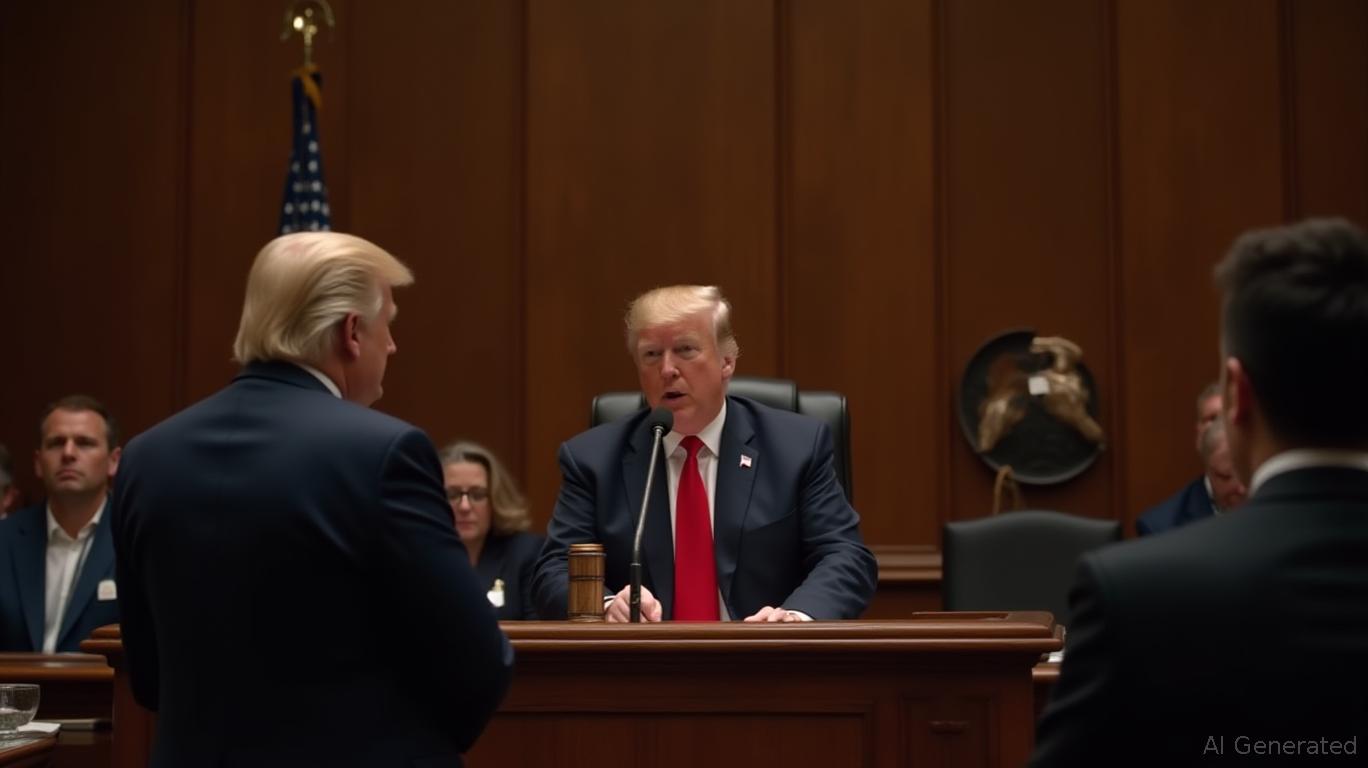U.S. Court Limits Trump's Tariff Power, Reigniting Battle Over Executive Authority
- U.S. appeals court rules Trump’s global tariffs exceed emergency powers under IEEPA, challenging their legality. - Decision upholds prior ruling rejecting IEEPA’s use for tariffs, setting mid-October deadline for potential enforcement halt. - Trump vows Supreme Court appeal, raising questions about executive authority and IEEPA’s limits amid political scrutiny. - Economists warn ruling creates uncertainty for businesses, potentially dampening trade and corporate activity globally. - Outcome could redefin
The U.S. Court of Appeals has ruled that most of Donald Trump’s global tariffs, often referred to as reciprocal tariffs, exceed his authority under emergency economic powers, marking a significant legal challenge to the policy’s legality. The court’s 7-4 decision on Friday upheld a prior ruling by the U.S. Court of International Trade, which similarly rejected Trump’s use of the International Emergency Economic Powers Act (IEEPA) to justify the imposition of tariffs on nearly all trading partners [1]. This ruling does not immediately remove the tariffs but sets a deadline for their potential enforcement halt by mid-October, pending further legal action in the U.S. Supreme Court [1].
The ruling centers around the IEEPA, a 1977 law that empowers the president to respond to national emergencies or threats from abroad. Trump repeatedly invoked this law during his presidency to impose tariffs he argued were necessary to address trade imbalances threatening U.S. national security. However, the appeals court found that the IEEPA does not grant the president the authority to impose tariffs or duties, nor does it include procedural safeguards to limit presidential power on such matters [1]. The decision underscores a clear legal distinction between presidential emergency powers and the authority to levy taxes, which the court emphasized resides with Congress.
Trump has vocally criticized the ruling, calling it a “disaster” for the country and claiming it threatens U.S. economic sovereignty. He has indicated plans to appeal to the Supreme Court, where a conservative-leaning bench could influence the final outcome. The Supreme Court’s involvement raises broader questions about executive power and the limits of the IEEPA, particularly in a political climate where similar legal challenges to presidential actions have been increasingly scrutinized [1]. For example, during the Biden administration, the court expanded the “major questions doctrine” to invalidate policies that extended existing laws into major policy areas without clear congressional authorization [1].
Economically, the ruling could have wide-reaching implications for U.S. businesses and global markets. Tariffs affect trade flows and corporate profitability by increasing costs for imported goods. The decision introduces uncertainty for companies that rely on imports, potentially deterring business activity with the U.S. until the Supreme Court rules definitively. Dr. Linda Yueh, an economist from Oxford University and the London Business School, noted that the ambiguity could “dampen down economic activity” as international partners wait for resolution [1].
The outcome of the Supreme Court case could also reshape Trump’s political standing and the legacy of his trade policy. A reversal of the appeals court decision would strengthen his position as a policy enforcer and could set a precedent for future executive actions under the IEEPA. However, an affirmation of the ruling would challenge his authority and diminish the perceived effectiveness of his trade agenda. The court’s decision is expected to influence not only current tariffs but also future trade negotiations and the enforceability of reciprocal trade agreements [1].

Disclaimer: The content of this article solely reflects the author's opinion and does not represent the platform in any capacity. This article is not intended to serve as a reference for making investment decisions.
You may also like
Asia Pioneers Tokenized Islamic Finance Integration

Crypto Markets Remain Resilient Amid U.S. Stock Market Labor Day Closure

XRP and the "Exit Liquidity" Trap: Why Are Long-Term Holders Doomed to Be the Scapegoats?

Solana News Today: Solana's 150ms Finality Revolution: Could It Outrace Ethereum?
- Solana's validator community nears approval of Alpenglow upgrade, slashing block finality to 150ms via Votor and Rotor components. - Upgrade enables 107,540 TPS (vs. Ethereum's 15-45 TPS) and introduces decentralized economic incentives to reduce centralization risks. - 99% voter support with 33% quorum met, positioning Solana to challenge Ethereum in DeFi, gaming, and institutional finance sectors. - Critics warn VAT model may favor large validators, but network's 20+20 resilience model and $8.6B DeFi T
